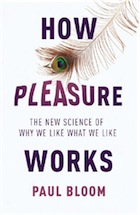
While recognizing some value to Bloom's argument here, i tend to lean more toward Jeremy Rifkin's argument in The Empathic Civilization, where he makes some compelling arguments for morality as a function of our innate ability to empathize.
Here is a review of Bloom's newest book, from Paul Hogan at The Guardian UK. I suspect his argument above is related to the material in this new book.Opinion
Nature 464, 490 (25 March 2010) | doi:10.1038/464490a;
Published online 24 March 2010How do morals change?
Paul Bloom1
Abstract
Emotions such as empathy and disgust might be at the root of morality, but psychologists should also study the roles of deliberation and debate in how our opinions shift over time, argues Paul Bloom.Where does morality come from? The modern consensus on this question lies close to the position laid out by the eighteenth-century Scottish philosopher David Hume. He thought moral reason to be “the slave of the passions.” Hume's view is supported by studies that suggest that our judgements of good and evil are influenced by emotional reactions such as empathy and disgust. And it fits nicely with the discovery that a rudimentary moral sense is universal and emerges early. Babies as young as six months judge individuals on the way that they treat others and even one-year-olds engage in spontaneous altruism.
All this leaves little room for rational deliberation in shaping our moral outlook. Indeed, many psychologists think that the reasoned arguments we make about why we have certain beliefs are mostly post-hoc justifications for gut reactions. As the social psychologist Jonathan Haidt puts it, although we like to think of ourselves as judges, reasoning through cases according to deeply held principles, in reality we are more like lawyers, making arguments for positions that have already been established. This implies we have little conscious control over our sense of right and wrong.
I predict that this theory of morality will be proved wrong in its wholesale rejection of reason. Emotional responses alone cannot explain one of the most interesting aspects of human nature: that morals evolve. The extent of the average person's sympathies has grown substantially and continues to do so. Contemporary readers of Nature, for example, have different beliefs about the rights of women, racial minorities and homosexuals compared with readers in the late 1800s, and different intuitions about the morality of practices such as slavery, child labour and the abuse of animals for public entertainment. Rational deliberation and debate have played a large part in this development.
Emotional and non-rational processes are plainly relevant to moral change. Indeed, one of the main drivers of moral change is human contact. When we associate with other people and share common goals, we extend to them our affection. Increases in travel and access to information as well as political and economic interdependence mean that we associate with many more people than our grandparents and even our parents. As our social circle widens, so does our 'moral circle'.
But this 'contact hypothesis' explanation is limited. It doesn't explain the shifts in opinions on issues such as slavery and animal rights. Contact cannot explain the birth of new moral ideas, such as the immorality of sexism or the value of democracy. It doesn't account for how our moral attitudes can change towards those with whom we never directly associate — for example, why some of us give money and even blood to people with whom we have no contact and little in common. There have been attempts to explain such long-distance charity through mechanisms such as indirect reciprocity and sexual selection, which suggest that individuals gain reproductive benefit from building a reputation for being good or helpful. But this begs the question of why such acts are now seen as good when they were not in the past.
What is missing, I believe, is an understanding of the role of deliberate persuasion. Language is an effective tool for motivating sympathy towards others. For example, Harriet Beecher Stowe's 1852 novel Uncle Tom's Cabin helped to end slavery in the United States, and descriptions of animal suffering in Peter Singer's Animal Liberation (1975) and elsewhere have been powerful catalysts for the animal-rights movement. Stories can be morally corrosive too: if we are encouraged to imagine people doing things that anger or disgust us, we are quick to evict them from our moral circle. Examples of this are all too familiar, such as Adolf Hitler's propaganda against the Jews in Nazi Germany, or the negative depictions of homosexuals put out by anti-gay campaigners in many countries today.
Stories emerge because people arrive at certain views and strive to convey them to others. It is this generative capacity that contemporary psychologists have typically ignored. Moral psychology in particular focuses nearly exclusively on studies in which volunteers are exposed to artificial moral dilemmas that have been thought up by other people, such as situations in which one must choose whether to kill one person to save five.
Everyday dilemmas
Proponents of the view that we are prisoners of our emotions might argue that moral deliberation and creativity are rare, perhaps restricted to people who spend their lives thinking about these issues, such as theologians and philosophers. Yet most people are regularly forced to ponder dilemmas such as the proper balance of work and family. Even though few of us write novels or produce films, humans are natural storytellers, and use narrative to influence others, particularly their own children.
It would be a mistake as scientists — and as politically and socially engaged citizens — to dismiss the importance of this reflective process in shaping our morality and, consequently, the world in which we live. Research might focus more on how children and adults deal with everyday moral problems, looking closely at cases in which their judgements diverge from those of people around them. Examples of work in this area include the studies by Robert Coles, a child psychiatrist at Harvard University in Cambridge, Massachusetts, on how black and white children dealt with racial desegregation and forced school integration during the US civil-rights movement, and the ongoing research by the psychologists Karen Hussar and Paul Harris at the Harvard Graduate School of Education on why some children raised in non-vegetarian households choose not to eat meat.
Psychologists have correctly emphasized that moral views make their impact by being translated into emotion. A complete theory must explain where these views come from in the first place.
Further reading
Coles, R. The moral life of children (Atlantic Monthly Press, 1986).
Bloom, P. Descartes' Baby: How the Science of Child Development Explains What Makes Us Human (Basic Books, 2004).
Haidt, J. Psychol. Rev. 108, 814–834 (2001).
Hamlin, J. K., Wynn, K. & Bloom, P. Nature 450, 557–559 (2007).
Pinker, S. ‘A History of Violence’ The New Republic (19 March 2007).
Pizarro, D. & Bloom, P. Psychol. Rev. 110, 193–196 (2003).
Singer, P. The Expanding Circle: Ethics and Sociobiology (Farrar Strauss Giroux, 1981).
Wright, R. Nonzero: The Logic of Human Destiny (Vintage, 2001).
- Paul Bloom is in the Department of Psychology at Yale University, New Haven, Connecticut 06520-8205, USA.
Email: paul.bloom@yale.edu
How Pleasure Works by Paul Bloom
From art to angel cakes, our fun today is directly related to ancient primal needs. It just takes a little imagination…
Phil HoganEvolutionary scientists remind us so often that our brains were made for the demands of the stone age that it's easy to forget how smart we are. It's true that human males are still hardwired to drag as many women into our cave as possible, but at least we have worked out what might happen if some of them aren't our wives.
How Pleasure Works: The New Science of Why We Like What We Like
by Paul Bloom
304pp, The Bodley Head Ltd, £16.99
The fully realised imagination is a wonderful thing, not only alerting us to life's multiple possible outcomes but allowing us to see into the past, read each other's minds, daydream and – pertinently, for the purpose of this enlightening and entertaining book – have more fun than we were designed for.
How, it asks, did our species get beyond the basic comforts of food, sex and animal skins? How did we end up with a taste for Tabasco sauce? Or watching golf? Paul Bloom, a psychology professor at Yale, believes our huge range of modern enjoyments are "the byproducts of mental systems that have evolved for other purposes". Where once the imagination was occupied keeping Cro-Magnon man ahead of the game, now it is the game, channelling our every sophisticated pleasure, from Shakespeare to Grand Theft Auto to relaxing in a Radox bath.
We've never had so diverting a time with our art, music, books, fashion and pornography. Though none of it seems obviously useful in a Darwinian sense, Bloom suggests that our new pleasures are linked to a fixed set of old ones based on primal needs. But while it's not hard to see that Belgian chocolates are also a vital source of sugar and fats, or that tenpin bowling is simply war by other means, Bloom argues that these preferences are the result of what he calls "essentialism" – an awareness of what lies beneath the basic properties of things. It may be too late to improve our genetic stock by having Elvis Presley's babies, but we can get close to the great man's "essence" by buying the trunks he wore in Fun in Acapulco on eBay. Similarly, we treasure ostensibly unremarkable objects – trinkets, photographs, ticket stubs, old cuff links – because they contain the "essence" of our own histories.
Bloom applies his essentialist theory across a spectrum of categories you feel he could have kept adding to for ever: symphonies, panoramic views, bottled water, pets, our gnawing need for spiritual or scientific truths, the question of what would happen if you inadvertently had sex with your spouse's identical twin. And how do you feel about cannibalism? Beyond the question of morals and legality (and the slightly offputting revelation that human flesh tastes like Spam), are we to conclude – as Bloom's line of reasoning seems to invite – that eating a fellow human being for the pleasure of his "essence" is fundamentally no weirder than wanting to marry a footballer? Taste, he argues – wherever you find it on the vast spectrum of our psychological urges and wants – is not rational but personal. You like ice cream, I like sautéed dog.
We may always be saved by disgust – essentially Bloom's pleasure principle in reverse, which kicks in, for example, when people are asked if they'd like to try on one of Hitler's old sweaters. One way or the other, imagination can get the better of you.

No comments:
Post a Comment